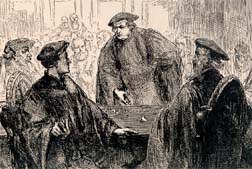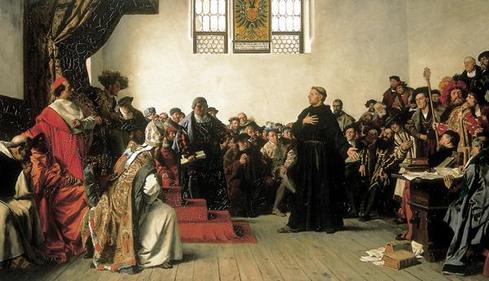
Link to Jason Stellman’s Farewell posting
In a stunning turn of events, Jason Stellman resigned from the Presbyterian Church in America (PCA) and is expected to convert to Roman Catholicism. Many know Mr. Stellman from his leading role in bringing charges against Pastor Peter Leithart before the Pacific Northwest Presbytery of the PCA . Soon after the news broke, Leithart wrote a blog posting: “Who’s got the gateway drug?” The term “gateway drug” is a reference to criticism that Leithart’s high church Calvinism has predisposed people to convert to Catholicism. Leithart counters that it was “some of the theological assumptions and ecclesial instincts of Protestant Confessionalists provide a smooth on-ramp to Catholicism or an off-ramp from Protestantism.”

Pastor Peter Leithart
As I read through Pastor Leithart’s apologia I found myself disturbed by certain philosophical assumptions in Leithart’s apologia. At times I wondered if there was not a postmodern fluidity in Leithart’s theological method that is at odds with historic Christianity. What I intend in this blog posting is describe the contours of Pastor Leithart’s epistemological framework, and then describe the Orthodox approach to the Christian Faith.
The Contours of Peter Leithart’s Epistemology
The following statements are taken from Pastor Leithart’s “Who’s got the gateway drug?” posted 4 June 2012.
1. Leithart assumes that the Christian faith itself evolves (improves) over time.
The golden age is not lost in the unrecoverable past but ahead of us in an eschatological future.
2. Leithart assigns priority to the future over the past. He rejects the priority of Tradition over contemporary theologizing:
…what I have critiqued elsewhere as “tragic metaphysics,” the notion that the original and old is necessarily preferable to the derived and the new.
Still, essential as the past is, for Protestants the past ought never become an ultimate standard.
3. Theology for Leithart is fluid and negotiable. Even the classic Christological and Trinitarian dogmas can undergo further revision.
Even the fixed points can be freshly formulated (cf. recent developments in Trinitarian theology and in Pauline studies). Beyond those few fixed points, much remains up in the air (for Catholics and Orthodox too), and will for centuries to come, as Christians continue to pore over the Scriptures and seek unity of mind concerning what they teach.
Its Trinitarian theology and eschatology give Christian faith an open-endedness that can be unsettling.
4. Leithart vigorously affirms sola scriptura, albeit in a manner that may surprise some.
Scripture remains fixed and immovable, the test and touchstone always of everything. Our understanding doesn’t stay fixed. Protestants should be perfectly comfortable with that.
No tradition can keep God from acting in new ways and saying new things in His world; God is Word, and therefore His voice is not simply identified with the voice of the church or the voice of the past.
Gateway to Liberal Theology?
As I read Pastor Leithart’s blog posting memories of my time in the United Church of Christ (UCC) come back to me. I once took part in a UCC forum where the Evangelicals and the Liberals presented their viewpoints. We closed the meeting singing the hymn: “We limit not the truth of God.” At the end of each stanza was the refrain:
The Lord hath yet more light and truth
To break forth from His Word.

There seems to some overlap in hymn and Pastor Leithart’s blog posting. While the United Church of Christ seems worlds removed from the PCA, it is important to keep in mind that this denomination has historic roots in New England Puritanism. Before Leithart and his supporters voice their objections, I invite them to compare his statements against the UCC’s new slogan: “God is still speaking to us” and the Comma logo.
The United Church of Christ’s official site explains the meaning of the Comma logo:
The comma was inspired by the Gracie Allen quote, “Never place a period where God has placed a comma.”
For the UCC the Comma is a new way to proclaim “Our Faith is 2,000 years old, our thinking is not.”
The UCC does not overtly repudiate Scripture. What it has done is to combine its reading of Scripture with the experience and concerns of contemporary culture. Absent in both Leithart and the UCC is any notion of an authoritative and binding magisterium. It seems that the only binding authority is that of one’s conscience and Scripture.
The Comma invites us to believe that God speaks through other people, nature, music, art, a theorem, the Bible, and in so many other ways.
The Comma pin reminds us of the unusual religious freedom and responsibility to engage the Bible with our own unique experiences, questions, and ideas.
Like Leithart, the UCC does not repudiate the past but seeks to integrate the best from the past with the best of the present. It is open to change and adaptation.
The Comma reminds us to balance our rich religious past with openness to the new ideas, new people, and new possibilities of the future.
I found the similarities in the philosophical assumptions between Pastor Leithart’s “Gateway Drug” posting and the UCC’s God is still speaking slogan unsettling and a little unnerving. I am not saying that Leithart’s theological views are liberal. Pastor Leithart and his colleagues in the Presbyterian Church in America and the Confederation of Reformed and Evangelical Churches have a history of anathematizing theological liberalism. It is highly unlikely that Pastor Leithart and his contemporaries will ever embrace theological liberalism.
Perhaps most of his students/disciples won’t either. My concern is more with his theological method. What will Pastor Leithart’s grandchildren do with his theological methods? What distinctives will be up for grabs with them? What new progressive innovations will they discover? With what kind of church doctrine and liturgy will his grandchildren (natural and spiritual) grow up in? I raise these questions because at one time the theology of the United Church of Christ wasn’t all that different from Evangelicals, but over time there took place a drift towards more radical positions.
Leithart versus the Confessionalists
As a good Calvinist Pastor Leithart affirms Scripture as the absolute norm for faith and practice. But he relativizes secondary authorities like the Westminster Confession. Relegating creeds to a secondary status is nothing new to Reformed Christianity, but the novelty lies with the extent to which Leithart is willing to go. While upholding the Westminster Confession’s authority for his denomination, Leithart views it as a human document, historically conditioned, that falls far short of the absolute authority of Scripture.
Confessionalists, after all, place a great deal of emphasis on the tradition of Reformed theology, embodied especially in Reformed confessions. Throughout the debates of the past few years, I have presented mainly biblical arguments for my positions, and kept historical concerns subordinate. My opponents have typically been much more interested in testing my views by the Westminster Confession. The touchstone of their theology is a piece of the Reformed tradition as much as, and in some cases more than, Scripture. Confessionalists claim that the Confession provides standard exegesis of Scripture, to which Reformed theologians have to submit. Confessional Reformed theology thus has a natural affinity for Rome that biblicists like me don’t share.
Leithart’s disagreement with the Confessionalists is rooted not so much in doctrine as in epistemology. The Confessionalist theological method rests on the assumption that the meaning of Scripture is clear and obvious and that confessional statements like the Westminster Confession rests on the clear and obvious meaning of Scripture. This is based on the doctrine of the perspicuity of Scripture, one of the corollaries to sola scriptura. The Confessionalist epistemology assumes a close correlation or congruence between the meaning of Scripture and the interpretation of Scripture. This particular approach to Christian truth leads to the belief that confessional statements like the Westminster Confession are objectively true in their reading of Scripture and universally valid; not historically conditioned and contingent as some would have it. It also assumes certain stability to the Christological and Trinitarian dogmas. Thus, the Confessionalist epistemology gives rise to stability and certitude to the way they do theology and organize church life. Leithart chafes at this epistemology preferring one that is more open ended and critically informed.
Leithart’s criticism of the Confessionalists seems to be informed by postmodern approach to truth which rejects the foundationalist notion of truth. The foundationalist understanding of truth has come under strong criticism, especially by the postmodernists who insist that our understanding of truth is historically conditioned, contingent, and at best incomplete.
For Pastor Leithart, Christian theology (Christian Truth) exists in a sort of neo-Hegelian epistemology of flux. Pastor Leithart seems to hold his Christian heritage at arm’s length, distance as theorems and hypotheses to be tested continuously in light of our study of Scripture. Theology for Leithart is more a journey than a destination. Thus, a confessional statement like the Westminster Confession is not so much a “binding address” for the faith community, but a signpost on the road we travel. Truth is not something clearly delivered once and for all time via the Holy Spirit to the Church. In Leithart’s understanding Truth is something that is approximated at best, and always unreached “out there” in the future. I want to make clear that for Leithart Truth is not denied; it is just embedded in epistemological flux. We may not have the Truth but we can nibble at it from a distance. Pastor Leithart insists that Protestants should be comfortable with this understanding of Truth.
What Scripture Teaches on Epistemology
Orthodoxy rejects the notion of an open-ended and evolutionary understanding of the Christian Faith because this not is what Scripture teaches. Scripture warns against private interpretation. We read in II Peter 1:20: “knowing this first, that no prophecy of Scripture is of any private interpretation.” In the early Church, it was the bishops, the Apostles’ disciples, who were given the responsibility and the authority to teach the Faith (II Timothy 4:1-5). Is it not significant that the Apostles did not create for their well trained and proven disciples, soon to be bishops (II Timothy 2:2) a compilation of essential doctrines as well as a canon of New Testament Scriptures? Is it also not significant that the Apostles devoted much of the early years of ministry in the proclamation of the Gospel and oral instruction in the Christian Faith, rather than compiling systematic treatises on the Apostolic teachings? Instead the Apostles exhorted their spiritual children to hold fast to the Apostolic teachings and trusted the Holy Spirit to guide future generations into all truth.
Eastern Orthodoxy emphasizes a distinct foundation for Apostolic Tradition. In Jude 3 we read about “the faith that was once for all entrusted to the saints.” In this short verse we learn four important lessons: (1) the definite article in “the faith” indicate that Jude is thinking about a specific body of teaching, (2) “once for all” (hapax) points to a unique onetime event like Christ’s atoning death on the Cross (cf. Hebrews 9:28), (3) “once for all” points to a unique event not a series of events, and (4) “entrusted” (paradidomi) refers to a traditioning process in which the Faith is handed on from one person to another. Doctrinal stability is seen in II Thessalonians 2:15: “Therefore, brethren, stand fast and hold the traditions which you were taught, whether by word or our epistles.” (NKJV) “Stand fast” implies fixity and stability, as opposed to the fluid progression implied in Leithart’s epistemology.
From the standpoint of the sociology of knowledge, the Orthodox and Reformed tradition have quite different approaches to doing theology. Orthodoxy functions as a “community of memory” when it seeks hold on to the Apostolic tradition without change. Orthodoxy also follows the principle of conciliarity, that is, theological differences are resolved through the collective action of the bishops, the designated successors to the Apostles. For the most part, Protestant theology seems to deny or overlook the church as a “community of memory” preferring to stress the individual reading of Scripture and the willingness of the brave individual to challenge church authority on the basis of sola scriptura. Protestant epistemology is based on a contestable and negotiable understanding of truth. In light of the fact that there is no received Tradition, Protestants must earnestly read Scripture, collect theological data from Scripture, then weigh the merits of competing theological positions in light of Scripture. This explains why biblical studies and exegesis are given such prominence among Protestants. Lacking the principle of conciliarity, Protestantism has suffered the misfortune of theological differences becoming entrenched in a plethora denominations and aberrant sects.
 The Church the Pillar of Truth
The Church the Pillar of Truth
But if the Church is indeed the pillar and ground of Truth (I Timothy 3:15), and if Christ’s promise that the Holy Spirit would guide the Church into all Truth holds true then there is no reason to believe that Truth is in an evolutionary flux. Christian Truth is not a set of intellectual constructs; Christian Truth is embodied in the Church which was founded on the authority of Jesus Christ and guided by the Holy Spirit. This capital “T” Tradition is not so much a set of beliefs but rather the life of Church indwelt by the Holy Spirit. The Apostle Paul in Ephesians described the Church in static terms, e.g., being built on the foundation of the apostles and prophets and whose cornerstone is Jesus Christ, and in dynamic terms, e.g., growing into a temple (Ephesians 3:20-22).
Protestant theology has long relied upon an incredible historical trope: (1) Apostolic Beginning, (2) Apostasy (soon after the apostles died), (3) Spiritual Darkness for over a thousand years, (4) Reformation and the Return of the Light. This particular trope has even been described by a Protestant writer as a de facto denial of Pentecost, where the Holy Spirit Blinks On and Blinks Off at different times in church history. This view of church history fosters a survivalist mentality that views the outside world as hostile and dangerous.
In the Orthodox epistemology the meaning of Scripture and the exegesis of Scripture are inseparable in the context of Holy Tradition. Where Leithart sees core doctrines like Trinity and Christology as contingent on the ongoing study and interpretation of Scripture, Orthodoxy believes that through the Ecumenical Councils the exegetical debates underlying the Christological and Trinitarian controversies were definitively and authoritatively settled.
This is based on the belief that Christ’s promise of Pentecost is real -– that the Ecumenical Councils were indeed truly guided by the Holy Spirit and that the decisions of the Ecumenical Councils are infallible and binding upon all Christians. This belief in Pentecost as an ongoing reality gives Orthodox epistemology a mystical dimension that is very different from the rationalism so characteristic of Western theology. In other words the Nicene Creed and the Ecumenical Councils function more as a “binding address” for all Christians, not as theological resources to be used as one sees fit. Leithart’s open ended and progressive hermeneutics to Scripture alienates him from the underlying assumptions of the Ecumenical Councils.
Leithart upends this historical trope by using an optimistic evolutionary perspective to church history. This optimistic view of church history reminds me of Philip Schaff’s The Principle of Protestantism. However, attempts to liken Leithart’s optimistic historical vision to classic Liberalism and the Social Gospel movement, while understandable, are mistaken. Leithart’s optimistic historiography is rooted in the post-millennial reading of biblical eschatology. This particular eschatology has roots in the theology of major Reformed theologians like John Calvin and Abraham Kuyper. This view sees in Scripture the promise of Christ to be with the Church as the nations are disciples along other Scripture passages that point a Christianized world filled with the knowledge of God as the waters cover the sea, and the promise that the Gates of Hell shall not prevail against the Church.

Icon – Ignatius of Antioch
If Orthodoxy has a particular historical trope, it would be that of the early martyrs who held to the Apostolic Faith even in the point of dying for Truth. It recognizes that society can be hostile to the Christian message but Christ has promised that Peter’s confession – the Gospel of Jesus as the Christ, the Son of God — would prevail against the gates of Hell and that the Holy Spirit would guide his Church into all truth. Orthodoxy despite being hidden from the West because of the Great Schism, living under Muslim rule and Soviet persecution amazingly safeguarded (some might even say supernaturally!) the Apostolic Tradition against external pressures like violent persecution and internal threats like innovation and heresy. Orthodoxy’s ecclesial approach to Christian Truth offers stability and solidity not found in the authoritarianism of the Roman Papacy and Protestantism’s ahistorical sola scriptura.
Epistemological Strategies
There are at least four epistemological stances one can take in the face of Pastor Leithart’s response to the collapse of Jason Stellman’s Protestant theology:
1. The eclectic Reformed catholicism taken by Peter Leithart who affirm the primacy of Scripture while taking an inclusive and eclectic approach to secondary sources, e.g., creeds, vestments, liturgy, critical scholarship.
2. The naive foundationalism of Protestant fundamentalism that ignores the dynamic fluidity of Protestant theology and shies away from critical thinking. The Confessionalist stance that Stellman once identified with seems to reflect this particular epistemology.
3. The monarchy of the Roman Papacy. This is for those who seek to find stability in the infallible magisterium of Rome. In this solution the chaos that arises from the postmodern reading of Scripture is corralled by the infallible magisterium of the Papacy.
4. The Apostolic Tradition safeguarded by Eastern Orthodoxy for the past 2000 years. This view rests upon the assumption that Christ gave the Holy Spirit to his Church and that under the guidance of the Holy Spirit the Church has preserved that Tradition against innovation and heresy.
I am not familiar with Mr. Stellman’s reasons for renouncing his Reformed views but I would like to suggest what may have motivated him was: (1) a reaction against the epistemological flux in Leithart’s approach to doing theology (Option 1), and (2) a preference for a more classic epistemology that views truth as accessible and Christian doctrine as possessing a stability that endures over time (Options 3 or 4).
Leithart is under the impression that Jason Stellman is heading to Rome because of a “postmodern recognition of the historical embeddedness and contextuality of all human knowledge.” This leads me to suspect that exposure to postmodern thought has closed off the path of naive foundationalism that underlies the Confessionalist position (Option 2). I suspect that Stellman’s preference for epistemological stability is much closer to the historic Christian Faith than Leithart’s more open ended quest version of Christian truth.
Despite their fundamental differences, Roman Catholicism and Protestantism share one important trait that makes them two peas in a pod – a developmental approach to faith and practice. The development of doctrine in the Christian West stands in sharp contrast with Orthodoxy’s determination to protect the Apostolic Tradition from innovation and heresy. While the monarchy of the Papacy may offer the promise of doctrinal stability, it should be kept in mind that it has unilaterally introduced doctrinal innovations that the Orthodox find objectionable: the Filioque clause, Papal infallibility, Papal supremacy over all Christianity, purgatory etc.
Like Leithart I find the foundationalist assumptions of the Confessionalists wanting but I have grave reservations about Dr. Leithart’s proposed remedy. (He holds a Ph.D. from Cambridge University.) He may well assert: “What I and my friends offer is the antidote to and not the cause of Roman fever.” It should be kept in mind that one of the serious side effects of Dr. Leithart’s medicine is epistemological vertigo. That is enough for many to decline and go elsewhere. And as mentioned before, we need to take into consideration the possible long term consequences of Leithart’s epistemological stance.
Climate Change for Protestantism?
If Jason Stellman’s crosses the Tiber, it is sure to cause consternation within Reformed circles. But what should be even more alarming is the fact that Stellman’s defection is part of a larger trend. Just a few days earlier on 27 May 2012, Joshua Lim, a brand new graduate from Westminster Seminary (Escondido) posted his conversion to Roman Catholicism. Similar conversions are happening elsewhere. Converts also include Gordon-Conwell graduates like Scott Hahn and Gerry Matatics. And then there is the resignation of the president of the Evangelical Theological Society, Francis Beckwith. All this raises the question: Why are so many of the best and the brightest leaving Protestant Christianity? It appears that Protestant Christianity is undergoing a “climate change,” i.e., a fundamental shift in the intellectual atmosphere, as Protestant theologians, pastors, and seminarians question the basis for sola fide and sola scriptura.
 As Protestantism undergoes an unprecedented climate change, once solid ice shelves have melted away leaving many floundering on what was once solid ground. Mainline Reformed denominations like the PCUSA and the UCC have already been heavily influenced by secular culture. Pastor Leithart and his colleagues may be able to hold the line of theological orthodoxy for this generation and the next, but how certain can they be that the generations after that will not succumb to theological liberalism? Protestants who are seeking a more stable and historic form of Christianity are faced with two choices: the monarchy of Roman Catholicism or the conciliarity of Eastern Orthodoxy.
As Protestantism undergoes an unprecedented climate change, once solid ice shelves have melted away leaving many floundering on what was once solid ground. Mainline Reformed denominations like the PCUSA and the UCC have already been heavily influenced by secular culture. Pastor Leithart and his colleagues may be able to hold the line of theological orthodoxy for this generation and the next, but how certain can they be that the generations after that will not succumb to theological liberalism? Protestants who are seeking a more stable and historic form of Christianity are faced with two choices: the monarchy of Roman Catholicism or the conciliarity of Eastern Orthodoxy.
The foundations beneath the house of Protestantism have other structural problems that we have highlighted elsewhere in this blog. Like a weakened body losing blood, Protestant Christianity is suffering a slow death by thousand cuts as new interpretations of Scriptures are propagated, church splits occur over doctrinal differences, and new denominations founded all the time. The promise of Pentecost is understood primarily in terms of personal experience, not within and for the entire Church. This has resulted in a widespread historical amnesia where Protestant Christians live their lives as if two thousand years of their Christian heritage never happened! It has also resulted in belief in an invisible “Church” and disbelief in a tangible visible Church. We invite Protestants to take seriously the Apostle Paul’s descriptiion of the Church as the “pillar and ground of truth” (I Timothy 3:15) and to consider whether that verse might be a fitting description of the Orthodox Church.
Robert Arakaki












Recent Comments